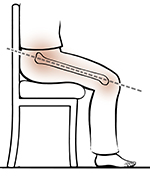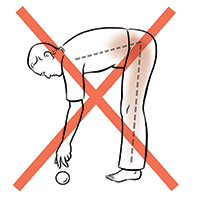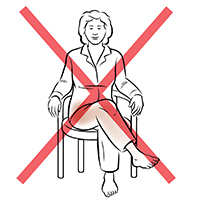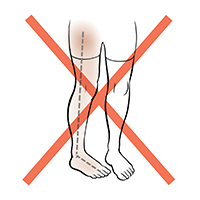Hip Precautions
Your new hip has a limited safe range of motion. This means it can’t bend and turn as much as a natural hip. So you’ll need to move differently now than you did before surgery. This will help prevent your new hip from popping out of place (dislocating). Precautions may vary depending on the surgical method, your surgeon's preferences, and your specific needs. Ask your surgeon if these measures apply to you.
Sitting safely
 |
| Your new hip has a limited range of motion. Always sit with your knees lower than or level with your hips. |
To protect your new hip, you must sit with your knees lower than or level with your hips. To do this, sit in chairs with high seats, preferably chairs with armrests. Placing a firm pillow on the seat of a chair can also help.
Following precautions
You must protect your new hip by preventing certain positions and movements. This will let your hip heal. It will also help keep it from dislocating. You may also be told to limit how much weight you put on your operated leg. You will learn how to follow precautions when lying, sitting, and standing.
Flexion precaution
 |
| Don’t bend over at the waist. And don’t sit with your hips lower than your knees. |
Adduction precaution
 |
| Don’t cross your operated leg over your other leg. ALWAYS keep your thighs apart. |
Internal rotation precaution
 |
| Don't turn your operated leg inward (pigeon toe). Pick up your feet when stepping around or turning. |
Online Medical Reviewer:
Rahul Banerjee MD
Online Medical Reviewer:
Raymond Turley Jr PA-C
Online Medical Reviewer:
Stacey Wojcik MBA BSN RN
Date Last Reviewed:
1/1/2025
© 2000-2026 The StayWell Company, LLC. All rights reserved. This information is not intended as a substitute for professional medical care. Always follow your healthcare professional's instructions.